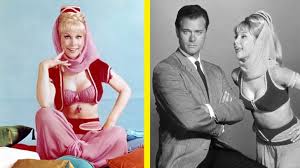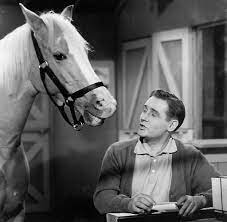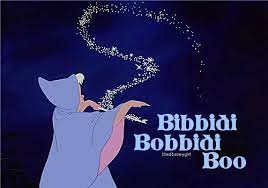It’s hard to watch Bewitched, a situation comedy from 1964. Bewitched is to women’s rights as thalidomide is to medications. For those of you who had the good sense to be born more recently, a brief recap will suffice: Samantha, a recently married person of the female persuasion, has magical powers, can do anything with a twitch of her nose. Her husband Daren insists that Samantha vacuum the house, cook meals, do laundry–without using her abilities. By the standards of today, Daren is abusive. Why would anybody agree to mop floors if she didn’t have to?
Daren forbids Samantha from being who she is. Always a bad plan. Even as a kid, I remember thinking why doesn’t Samantha just turn Daren into a frog and have a nice magical meal on her own?
Every episode was the same. None of the neighbors knew that Samantha was a witch. Hilarity—such as it was—ensued when one of the lesser characters would—almost!—find out that Samantha could cook a chicken without an oven.
I Dream of Jeannie was the same show, a man forbidding his wife from using magic. The plot involved Major Nelson hiding Jeannie’s abilities from the world. He wanted a normal wife, not one who could transport him to an island in the South Seas, put him up in a castle, and fund his retirement account.
The nice thing about these shows was that every week was the same. The girls would use their abilities; someone would notice that something was amiss; the secret would be kept safe until the next week—139 episodes of I Dream of Jeannie, 254 for Bewitched. Mr. Ed was also the same show, except that the horse—other than speaking clandestinely—could neither fly nor look good in a bikini.
I will leave it to my gentle readers to discuss:
- How any sentient being could write the same show week after week
- How little there was to do in the early 60s apparently. We watched the same show week after week. Go out and play? Read a book? Go for a run? Get married? Have a life? No thanks, gotta watch a show about a talking horse who won’t communicate with anyone other than Willlburrr.
- How woman—some women certainly—could accept the models of subservient witches and genies who, rather than flexing their powers and making the men do their own darn sweeping and mopping, were content not to use their magic.
Rather I want you to consider what secret powers our children might have—hidden in plain sight. I’m not talking about bippity, boppity, boo. I’m just wondering what the next 50 years might bring us. Are you wishing your active child would read more books? Do you desire that your bookish child would pick up a ball? Do you long for your quiet child to be more communicative? Do you want your child who talks all the time to be quiet?
In the fullness of time, our children will inherent not just our estates but our mistakes. What will they have to say about the decisions we made as parents? Will they reflect, my folks never knew me for who I was, never saw the real me, tried to change me into someone else? Or will they look back and say, my folks always accepted me for who I was?
Half a century ago Daren and Major Nelson missed out on extraordinary experiences. Their wives could have taken them to the Marianas Trench, to the top of Kilamanjaro, to the premier of Katherine Hepburn’s Lion in Winter. By not allowing their wives to be who they were, they remained Earthbound disregarding astonishing possibilities.
Let’s do better by our children. Let’s allow them to be who they are, to show their powers, magic and pedestrian. Because I don’t know about you, but I insist that my relationship with my kids is better than a repetitive 60s sitcom.







3 thoughts on “Are Your Kids Magic?”
David,
You have an amazing insight here. I did watch those TV shows. At least a few times. But not many times because as you say, it was always the same thing. A situation comedy in which the situation didn’t vary. And the premise of the first two reads as a reiterated answer to the beginnings of the feminist movement. Maybe women watched and wondered, “What could I do if I did not have to obey my husband (boyfriend?) who refuses to let me be myself?” And men watched thinking, “I wished my wife were more cheerful about obeying me.” Truly depressing thoughts. And fully a decade before “The Stepford Wives” aired.
Children are magical, in that they continually have the possibility to do new things that just the day before they were incapable of. How they learn to walk, to speak and to make new thoughts and express them. It is magical, though so commonplace that it is perhaps taken for granted. Especially by the anxious parents to whom you address these posts who can’t recognize what their child is actually capable of in their focus on comparing their child to “the competition” and unrealistic goals the parents set.
I don’t think magic can be expressed, and certainly not appreciated, in the face of anxiety. Or to put it another way, anxiety is a sure killer of magic, more so than even skepticism.
Reading this post I found myself thinking of a story I read about Somalian refugees settling in Minnesota. Upon watching a Mr. Ed rerun, thy apparently engaged in a debate about whether horses could talk. Having recently been educated about man’s excursion to the moon in 1969, a feat they couldn’t imagine was possible, a talking horse seemed feasible. In the modern world, it’s not only important to allow your children to be who they are. It’s also important to expand their horizons. When I was growing up, lots of cops were Irish because the Irish kids fathers were cops. Sons and daughters of laborers didn’t consider college because their parents hadn’t attended one. So, I ask, oh wise one, how should 21st Century parents give their kids the vision to explore all possibilities, not just the ones that come readily to hand?
I will admit that the title intrigued me even more than your regular weekly submissions. I am a magician, and in 1993 (the year that I turned fifty), I started Fantastic magic Camp (www.magiccamp.com), which uses the fascination and fun of magic, juggling and puppets to raise self esteem in school-aged children. So I have worked with thousands of kids who were, indeed, MAGIC!
What I learned from the camp was how to appreciate kids for who they are, rather than trying to mold them into our concept of the way they should be. Your newsletter therefore resonates with my experience.